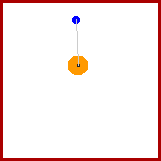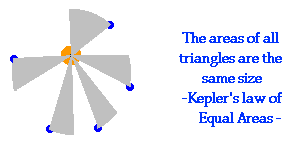
Kepler's Second
Law
A GIF Animation
After studying a wealth of planetary data for the motion of the
planets about the sun, Johannes Kepler proposed three laws of
planetary motion. Kepler's second law states
An imaginary line adjoining a planet
and a sun sweeps out an equal area of space in equal amounts of
time.
The animation below depicts the elliptical orbit of a planet
about the sun.

The ticker tape pattern shows that as the planet is closest the
sun, the planet is moving fastest and as the planet is farthest from
the sun,it is moving slowest. Nonetheless, the imaginary line
adjoining the center of the planet to the center of the sun sweeps
out the same amount of area in each equal interval of time.

For more information on physical descriptions of motion,
visit
The
Physics Classroom. Specific information on circular motion will
be available soon at The Physics Classroom. Currently, specific
information is available about the following topics:
This page was created by
Tom
Henderson of
Glenbrook South
High School.
Comments and suggestions can be sent by e-mail to
Tom
Henderson.
This page last updated on 6/6/97.

